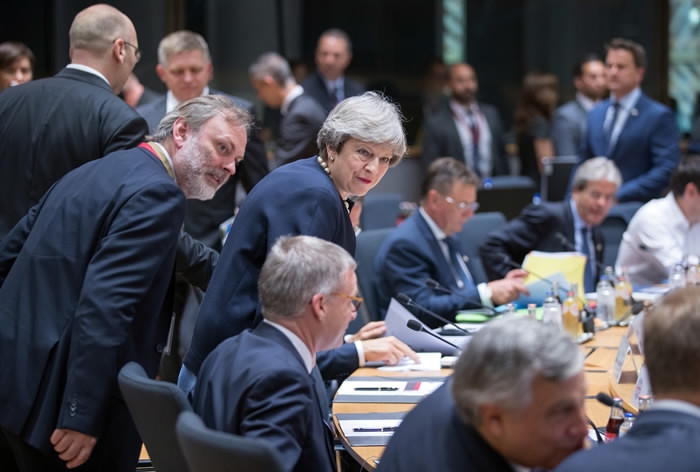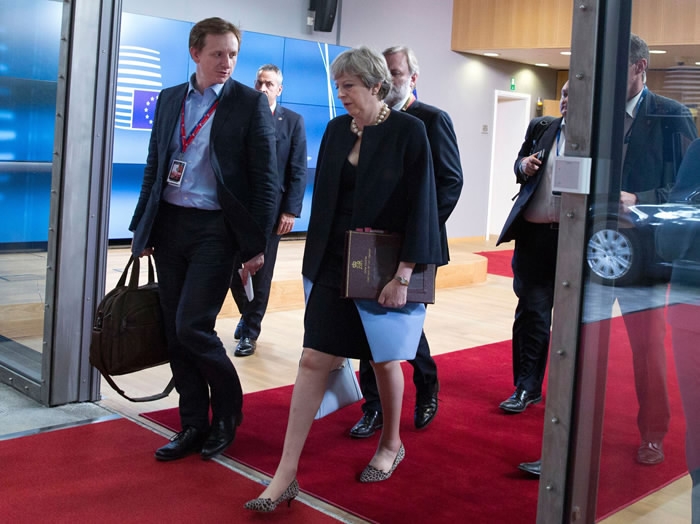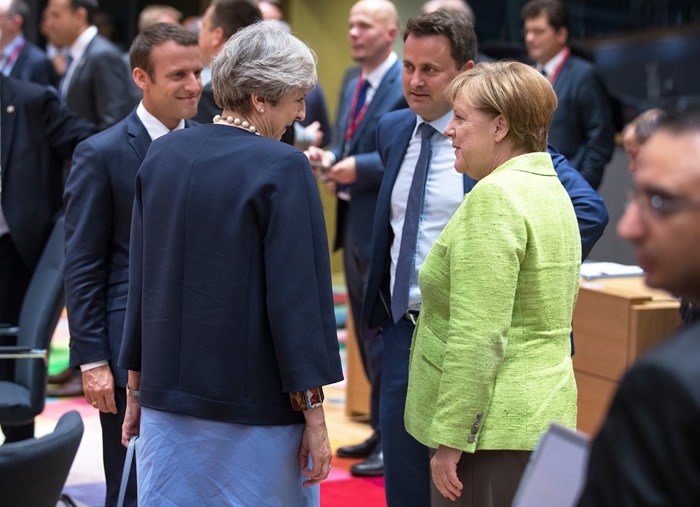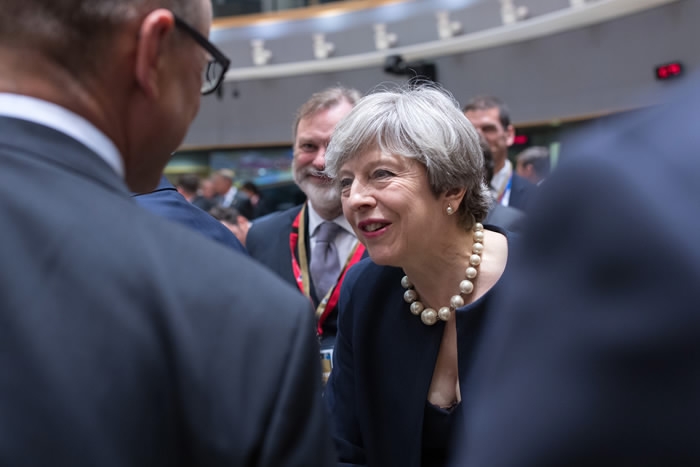British Prime Minister Theresa May promised on Thursday to let EU citizens stay after Brexit as she met skeptical European leaders for the first time since her disastrous election gamble.
Under pressure from all sides since losing her parliamentary majority in the June 8 vote, May held out an apparent olive branch on the uncertain fate of three million Europeans living in Britain.
German Chancellor Angela Merkel said the plans were a "good start," but added that "there are still many, many other questions" to be dealt with over Brexit.

British Prime Minister Theresa May (C) arrives for the round table talks during an EU summit in Brussels, Belgium, June 22, 2017. /VCG Photo
Details of UK proposal to be published on Monday
May offered fellow EU leaders a "fair" deal for compatriots living in Britain after Brexit, though her peers demanded more detail from a prime minister weakened by the electoral misfire two weeks ago.
Given the floor for 10 minutes at the end of a Brussels summit dinner, May outlined five principles, notably that no EU citizen resident in Britain at a cut-off date would be deported.
That was, she told them, "a fair and serious offer," a British official said. It was "aimed at giving as much certainty as possible to citizens who have settled in the UK, building careers and lives, and contributing so much to our society."

British Prime Minister Theresa May (L2) leaves from an EU summit in Brussels, Belgium, June 22, 2017. /VCG Photo
Promising details on Monday, May also said those EU citizens who had lived in Britain for five years could stay for life.
Those there for less would be allowed to stay until they reach the five-year threshold for "settled status." Red tape for permanent residency would be cut and there would be a two-year grace period to avoid "cliff edge" misfortunes.
'Good start,' but 'long way to go'
Merkel, who earlier said she wanted "far-reaching guarantees," described giving full rights to those in Britain for five years as "a good start" but said many questions remained.
"It is a first good step which we appreciate," said Austrian Chancellor Christian Kern. "Many details are left open. A lot of European citizens are concerned and not covered by May's proposal. There is a long, long way to go for negotiations."

British Prime Minister Theresa May (L2) talks with German Chancellor Angela Merkel (R1), French President Emmanuel Macron (L1) and Luxembourgish Prime Minister Xavier Bettel (R2) during an EU summit in Brussels, Belgium, June 22, 2017. /VCG Photo
May's push to set the cut-off date as early as March 29 this year is unlikely to wash with many in the European Union, whose position is that nothing must change until Britain leaves – scheduled for March 30, 2019. And there was much missing from an outline offer which the British previously called "generous."
No discussion between May and EU leaders
Another sticking point could be May's rejection of another EU demand that expats be able to enforce their rights in the EU court.
Brussels has been dismissive of May's call for sweeping and quick guarantees for expats, including over a million Britons on the continent, and says only detailed legal texts can reassure and take account of complex, multinational family situations.
Leaders had agreed with summit chair Donald Tusk not to open discussions with May and she left immediately afterwards, leaving the other 27 to discuss other Brexit issues without her.
They were briefed by Michel Barnier, who launched the Brexit negotiations for them on Monday, and discussed the move of two EU agencies from London after Britain quits.

British Prime Minister Theresa May (R) greets Finnish Prime Minister Juha Sipila during an EU summit in Brussels, Belgium, June 22, 2017. /VCG Photo
EU priorities before Brexit talks
Merkel had earlier made clear that Britain's exit was not at the top of the agenda for the remaining 27 EU members, as they try to capitalize on a renewed sense of optimism to put the bloc back on track after years of austerity and crisis.
The EU sought instead to show its unity by pressing ahead with plans on counter-terrorism, defense and by renewing damaging economic sanctions against Russia over the war in eastern Ukraine.
"For me, the shaping of the future of the 27 is a priority coming before the issue of the negotiations with Britain on the exit," said Merkel.
New French President Emmanuel Macron, attending his first summit, added that the EU had to "establish our own strategy based on our own interests."
(Source: Reuters, AFP)
Related stories:
EU, UK leaders gather in Brussels for two-day meeting
EU president says Brexit can still be reversed
UK bows to EU Brexit talks timetable, reaffirms 'hard Brexit' plan









